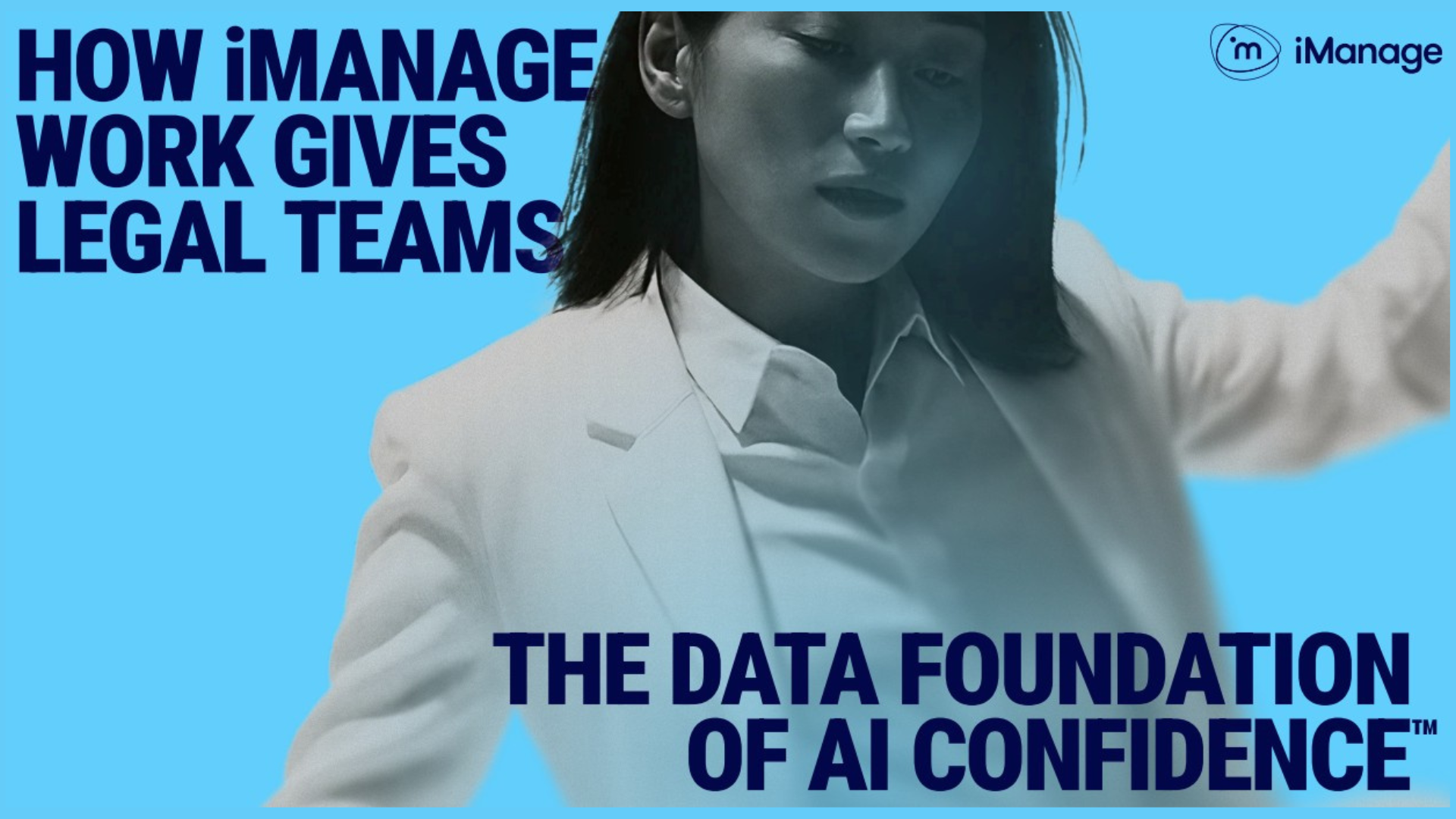Sponsor Content Created With iManage
Tired of legal AI tools that overpromise but underdeliver? The secret to success is in your firm’s data
Don't let legal AI tools overpromise and underdeliver: the secret to success isn't the software, but building a secure, stable, and connected data foundation that transforms your firm's complex, siloed information into structured knowledge.

Legal professionals are no strangers to hype. From e-discovery platforms that promised to revolutionize litigation to contract analytics tools that claimed to read like seasoned attorneys, the legal tech landscape is littered with solutions that dazzled in demos but fizzled in deployment.
Today, artificial intelligence (AI) is the latest tech innovation — and once again, many firms are finding themselves disappointed.
Why do so many legal AI tools underdeliver? The answer lies in the data.
The Achilles’ heel of AI: data quality
AI vendors often showcase impressive capabilities, including instant document summarization, predictive litigation outcomes, and automated contract review. But AI tools don’t create intelligence — they amplify and augment it from existing data.
Rich, well-organized, and searchable data is the foundation for meaningful AI outputs. Without a robust, well-structured data foundation, even the most sophisticated AI models will struggle to deliver meaningful value.
“In the excitement surrounding artificial intelligence for legal applications, a critical element often gets overlooked: data quality,” says Melissa Koch, a business and technology lawyer at Akerman LLP, in a recent Bloomberg Law article.
She adds, “This isn’t just a technical oversight. It’s a strategic miscalculation that undermines AI’s potential value.”
Legal data is notoriously complex. It’s siloed across practice groups and scattered across case management systems, document management systems, cloud storage, and network file shares that were likely created before we had even heard of the AI era — and locked behind inconsistent metadata.
It’s imperative for organizations to ensure the systems they use have access to all and any necessary data, according to Tomas Gorny, CEO of Nextiva.
“Any AI tool is only as good as the information it ingests; data silos can stand in the way of an otherwise well-planned UCXM [unified customer experience management] implementation,” he adds in his National Law Review article.
Worse, many AI tools fail to reflect the nuances of legal reasoning, jurisdictional variation, or firm-specific workflows. The result? Tools that sound smart but falter in real-world use.
The secret: A secure, stable, connected data platform
Firms that succeed with AI aren’t just buying new tools. They’re building platforms. At the heart of these platforms is a secure, stable, and connected data foundation — one designed specifically for legal workflows.
This foundation isn’t just a repository. It’s a living system, built by data scientists and knowledge engineers who understand how lawyers work. It stores documents in context, indexes them with precision, and connects them across matters, clients, and jurisdictions. It captures metadata, preserves version history, and supports granular access controls. In short, it transforms raw information into structured knowledge.
With this kind of foundation, AI tools can deliver what they promise. They can surface relevant precedents, flag risky clauses, and generate summaries that reflect firm-specific language. And they can evolve, ultimately, becoming smarter and more aligned with your practice.
Building trust: Why data drives confidence in AI
Trust in AI comes from experience. When lawyers see that an AI tool consistently delivers accurate results, they begin to rely on it. When they understand how the tool works — and how it’s grounded in their own firm’s data — they gain confidence. When they can trace outputs back to inputs, they feel in control.
This kind of trust is only possible with a transparent, well-managed data platform. It allows firms to audit AI decisions and ensure compliance with ethical and regulatory standards. It empowers lawyers to collaborate with technologists, shaping tools that reflect their expertise. And it turns AI from a black box into a trusted partner.
“Involve lawyers early: don't start with the technology; start with the lawyers' pain points,” advises Natasha Ahmed, a partner at Akin Gump, in a research report created in partnership with iManage entitled ‘Balancing Innovation & Trust: Practical AI Integration for Law Firms.’
She continues: “Ask them what tasks are repetitive or frustrating. This should give you a clear idea of lawyer-driven AI use cases.”
From chaos to confidence: A roadmap to success
How can your firm move from frustration to success? Here’s a roadmap to help you get started on your AI journey:
- Audit your data landscape. Start by understanding what data you have, where it lives, and how it’s structured. Identify silos, gaps, and inconsistencies. Map your document types, metadata standards, and access controls.
- Adopt a unified data platform. Invest in a platform that can ingest, index, and manage your data across systems. Ensure it supports legal-specific metadata, versioning, and security protocols. Choose an extensible solution — one that can grow with your firm.
- Collaborate across disciplines. Bring together lawyers, technologists, and knowledge managers. Define use cases, set success metrics, and co-design workflows. Ensure that AI tools are grounded in your firm’s language, logic, and priorities.
- Build trust through transparency. Educate your legal teams about how AI works, what it can and can’t do, and how it’s grounded in firm data. Provide audit trails, explainability features, and feedback loops.
Data is the differentiator
In the race to adopt legal AI, tools get the headlines — but data wins the game. Firms that invest in a secure, stable, connected document management system (DMS) as their trusted data foundation will unlock the true potential of AI.
An iManage report published earlier this year ‘Ground your legal AI strategy firmly in the basics’ highlighted the importance of strong foundational tools supporting document and email management.
“The insights in this new report provide a valuable roadmap for firms still contemplating how to invest in solutions that enable them to keep growing into the future capabilities that AI can offer,” said Laura Wenzel, global marketing and insights director at iManage when the report, which surveyed more than 1,200 legal professionals in UK, US, EMEA, and Asia Pacific, was launched.
“Understanding what legal professionals need to efficiently manage their document workflows can help organizations make informed, strategic DMS investments that drive adoption, deliver lasting value, and set the stage for effective use of advanced technologies.”
Ensuring legal firms have the right DMS makes AI understandable, controllable, auditable, and improvable — all core ingredients of confidence in any intelligent system. Furthermore, a robust and reliable DMS provides the structure, safety, and flexibility needed for organizations to more confidently and successfully expand their AI investments across the business.
They’ll move beyond hype to impact. They’ll build systems that reflect their expertise, support their workflows, and earn their trust.
So, if you’re tired of legal AI tools that overpromise and underdeliver, don’t just switch vendors. Start with your data. The secret to success isn’t in the tool itself. It’s in the foundation you build beneath it.
Sign up today and you will receive a free copy of our Future Focus 2025 report - the leading guidance on AI, cybersecurity and other IT challenges as per 700+ senior executives
-
 Anthropic researchers warn AI could 'inhibit skills formation' for developers
Anthropic researchers warn AI could 'inhibit skills formation' for developersNews A research paper from Anthropic suggests we need to be careful deploying AI to avoid losing critical skills
-
 CultureAI’s new partner program targets AI governance gains for resellers
CultureAI’s new partner program targets AI governance gains for resellersNews The new partner framework aims to help resellers turn AI governance gaps into scalable services revenue
-
 The Data Foundation of AI Confidence
The Data Foundation of AI Confidencewhitepaper
-
 Yes, legal AI. But what can you actually do with it? Let’s take a look…
Yes, legal AI. But what can you actually do with it? Let’s take a look…Sponsored Legal AI is a knowledge multiplier that can accelerate research, sharpen insights, and organize information, provided legal teams have confidence in its transparent and auditable application
-
 What can AI do to empower those working in the legal sector today, tomorrow, and beyond?
What can AI do to empower those working in the legal sector today, tomorrow, and beyond?Supported AI is transforming the legal profession — from streamlining today’s workflows to shaping tomorrow’s strategies. For firms, the choice is clear: embrace trusted AI tools now or risk falling behind in a rapidly evolving landscape
-
 AI in the legal sector: How to separate the signal from the noise
AI in the legal sector: How to separate the signal from the noiseSupported From contract review to litigation strategy, AI promises efficiency. But with so much noise in the market, legal professionals must know how to spot tools that deliver real value
-
 How AI can help rather than hinder knowledge workers in the legal profession
How AI can help rather than hinder knowledge workers in the legal professionSupported AI won’t replace lawyers — it empowers them. Free from routine tasks, legal pros can focus on strategy, judgment, and client success
-
 AI legal confidence: What is it and how do you get there?
AI legal confidence: What is it and how do you get there?Supported AI is reshaping legal practice, but doing so successfully comes down to building trust and confidence...